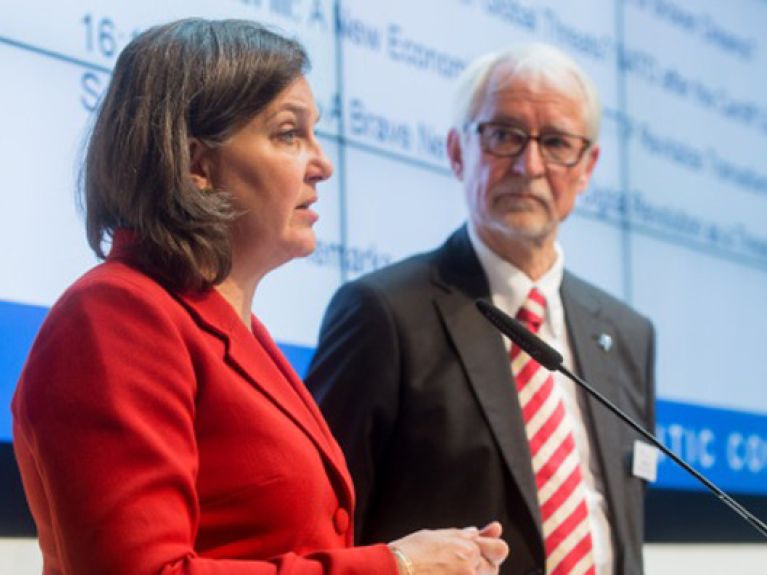Dialogue on transatlantic values
The Aspen Institute Germany is celebrating its 40th anniversary – and squaring up to today’s challenges.

There is a place in Berlin that Rüdiger Lentz is particularly fond of recommending to young people: an exhibition space called “BlackBox Kalter Krieg” at Checkpoint Charlie. Lentz is not one to dwell on the past, on the contrary. But as the Executive Director of the Aspen Institute Germany knows, “nobody who grew up after the Wall came down in Berlin can have any idea of how divided Germany was and how it lived in the midst of the icy conflict between East and West. That is part of German history and people need to remain aware of it.” One of the reasons why this idea of remaining aware of things is so important to Lentz is that despite its rich history, Aspen Institute Germany has a keen eye for the challenges and political crises of the present. Lentz says: “If you look only to the past, you cannot shape the future.”
Aspen Institute Germany trains people’s eye for the present by means of comprehensive programs that include seminars for leading figures and decision-makers from the world of politics, business, academia, and the media. The Institute’s public program is geared to a wider audience. One example – a discussion evening on the Transatlantic Trade and Investment Partnership TTIP in summer 2014. Another, the first Berlin Transatlantic Conference; it took place in October as part of the celebrations to mark the Institute’s 40th anniversary. The conference’s motto also highlighted the fact that Lentz and his team would rather ask questions than be complacent about what they have already achieved: “The Transatlantic Partnership at Stake: Do We Still Need Each Other?” asked the conference title; at a roundtable the questions discussed were not only free trade but also the role of NATO and the threats to people’s private spheres and their safety posed by the “digital revolution”. In her keynote speech, Victoria Nuland, Assistant Secretary of State in Washington, mentioned the strain placed on German-American relations by the NSA affair. Talking about a way out of this crisis of confidence she said: “This is hard, hard work. What we are trying to do is restructure our intelligence relationship for the 21st century. I am confident that we will do it and that we will be successful at it.”
However strong the transatlantic bond may be, Lentz stresses that dialogue is essential. With regard to data security he refers to Germany’s historical experience with the Nazi regime of total surveillance and terror: “Accordingly, we Germans have become particularly sensitive about surveillance by the state – rightly so.” And Lentz also says: “A transatlantic partnership does not mean 100% congruence in all areas but that a dialogue is conducted between friends, one that must also be able to withstand conflict and controversial debates.” As his professional career demonstrates, Lentz is committed to the transatlantic ideal – amongst other things, he was editor-in-chief at a German-American television station, RIAS-TV, and was in charge of the Deutsche Welle bureau in Washington. Lentz is the first German to take the helm at Aspen Institute Germany. He himself sees this as a “sign of normality” in German-American relations.
Normality yes, but routine preferably not: over the coming years Lentz would like to take the “dialogue on transatlantic values” out to a wider audience: “Now that hundreds of thousands of American soldiers are no longer stationed in Germany many people have lost their understanding of why the transatlantic community of safety and values remains so important.” On the other hand, he sees the Ukraine crisis and the annexation of the Crimea by Russia as an acid test: “We need to ask ourselves what values such as freedom mean to us. To what extent are we prepared to stand up for them? And what political and diplomatic tools are available to us to this end?” He expounds that even in times of acute political crisis Aspen Institute Germany aspires to kindle dialogue and make fruitful use of its numerous contacts with decision-makers.
Not long ago, on a November evening in Berlin, it once again became clear how seriously this was meant. The panel at the British Embassy included no less than nine foreign ministers – in cooperation with the German Federal Foreign Office and the British Embassy, Aspen Institute Germany had sent out invitations to its Sixth Southeast Europe Foreign Ministers’ Conference; Federal Minister for Foreign Affairs Frank-Walter Steinmeier and his British counterpart Philip Hammond were patrons of the evening. With its panels and many informal opportunities for discussions the conference once again offered a framework for an exchange of views that was anything but a matter of course. “Nowadays, for example, the Serbian and the Kosovar foreign ministers sit down at the table and try together to diffuse conflicts between their states and to collaborate from a European perspective,” explains Lentz, talking about Aspen Institute Germany’s Southeast Europe program that brings together decision-makers and experts from the Western Balkans, Turkey, Russia, the United States, Germany, the EU, NATO and other international organizations, “approaching an Euro-Atlantic security community,” as Lentz puts it. Security and a reliable partnership are values worth upholding. Something that both history and the present have taught us.
